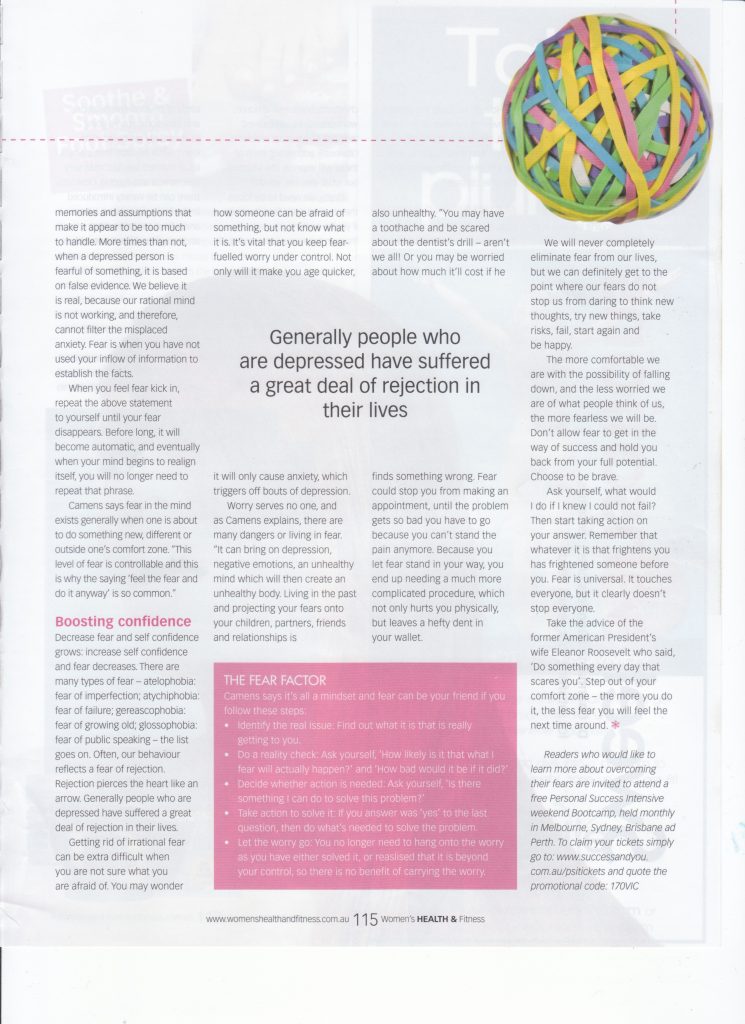

facing your fears
The first American journalist to be expelled from Nazi Germany,Dorothy Thompson once said: “Only when we are no longer afraid do we begin to live”. Success Coach Tamra Mercieca explains the truth behind this.
We are taught fear at a very young age. It is a learned behaviour, therefore it can, if we wish, be educated out of us. Fear is a way of thinking that has the ability to hinder or help our life. What is important is to learn how to use fear to our advantage and not allow it to work against us.
There is a place for fear. When fear shoots through our veins, constricting our blood flow – it places the body in survival mode. It keeps us safe and stops us from taking unnecessary risks. It is a primal and basic instinct, to be honoured when it’s needed and discarded when it’s not.
Life Coach Anjie Camens says actual fear assists in the process of achieving ones fight or flight mode and this process is natural to the human body. “This is generally an automatic process to create the needed actions to react instantly.”
Functional fear presents itself when you are in danger. Your house catches alight and it is fear that sends you running out the door, away from the scorching flames of the fire. This fear is a response to a real threat and keeps you careful and alert – it stops you from getting hurt. But as much as fear can stop you from getting burnt and even save your life, it can also stop you from moving forward.
When fear works against you it can be paralyzing. It can make you doubt yourself and come up with lame excuses to get out of things that you’re too scared to deal with. When you lose faith in yourself the doubting begins and the fear moves right in.
Irrational fear often shows up as worrying, when you are afraid of something that might happen in the future. You mull over something without having any real proof that what you dread will actually eventuate. It could be out of your control, but you still worry about the outcome.
When you suffer irrational fears, consider the real meaning of the word:
FALSE
EVIDENCE
APPEARING
REAL
Often it is the imagination that fuels fear. It is not the event itself that is frightening, it is your memories and assumptions that make it appear to be too much to handle. More times than not, when a depressed person is fearful of something, it is based on false evidence. We believe it is real, because our rational mind is not working, and therefore, cannot filter the misplaced anxiety. Fear is when you have not used your inflow of information to establish the facts.
When you feel fear kick in, repeat the above statement to yourself until your fear disappears. Before long, it will become automatic, and eventually when your mind begins to realign itself, you will no longer need to repeat that phrase.
Anjie Camens says fear in the mind exists generally when one is about to do something new, different or outside ones comfort zone. “This level of fear is controllable and this is why the saying ‘feel the fear and do it anyway’ is so common.”
Decrease fear and self confidence grows: increase self confidence and fear decreases.
There are many types of fear – atelophobia: fear of imperfection; atychiphobia: fear of failure; gereascophobia: fear of growing old; glossophobia: fear of public speaking – the list goes on. Often our behaviour reflects a fear of rejection. Rejection pierces the heart like an arrow. Generally people who are depressed have suffered a great deal of rejection in their lives.
Getting rid of irrational fear can be extra difficult when you are not sure what you are afraid of. You may wonder how someone can be afraid of something, but not know what it is. It’s vital that you keep fear-fueled worry under control. Not only will it make you age quicker, it will only cause anxiety, which triggers off bouts of depression.
Worry serves no ones, and as Camens explains, there are many dangers or living in fear. “It can bring on depression, negative emotions, an unhealthy mind which will then create an unhealthy body. Living in the past and projecting your fears onto your children, partners, friends and relationships is also unhealthy.”
You may have a toothache and be scared about the dentists drill – aren’t we all! Or you may be worried about how much it’ll cost if he finds something wrong. Fear could stop you from making an appointment, until the problem gets so bad you have to go because you can’t stand the pain anymore, Because you let fear stand in your way, you end up needing a much more complicated procedure which not only hurts you physically, but lives a hefty dent in your wallet.
Camens says it’s all a mindset and fears can be like wise friends if you follow these steps:
- Identify the real issue: Find out what it is that is really getting to you.
- Do a reality check: Ask yourself, ‘How likely is it that what I fear will actually happen?’ and ‘How bad would it be if it did?’
- Decide whether action is needed: Ask yourself, ‘Is there something I can do to solve this problem?’
- Take action to solve it: If you answer was ‘yes’ to the last question, then do what’s needed to solve the problem.
- Let the worry go: You no longer need to hang onto the worry as you have either solved it, or reaslised that it is beyond your control, so there is no benefit of carrying the worry.
We will never completely eliminate all fears from our lives, but we can definitely get to the point where our fears do not stop us from daring to think new thoughts, try new things, take risks, fail, start again and be happy.
The more comfortable we are with the possibility of falling down, and the less worried we are of what people think of us, the more fearless we will be. Don’t allow fear to get in the way of success and hold you back from your full potential. Chose to be brave.
Ask yourself, what would I do if I knew I could not fail? Then start taking action on your answer. Remember that whatever it is that frightens you has frightened someone before you. Fear is universal. It touches everyone, but it clearly doesn’t stop everyone.
Take the advice of the former American President’s wife Eleanor Roosevelt who said, ‘Do something every day that scares you’. Step out of your comfort zone – the more you do it, the less fear you will feel the next time around.
If you’d like to read some more recent blogs and articles Tamra has written on overcoming your fears, take a peek at these:
How to keep fear at bay. Your free video tutorial.
